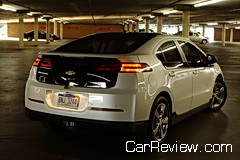| Chevrolet Volt Consumer Reviews |
Chevrolet Volt More Expert Reviews |
2011 Chevrolet Volt Photo Gallery |
2011 Chevrolet Volt Specs |
 |
|||
By Dan Tsuchiya
Positrons
- Great Design and better looking than any Prius made to date
- Electricity first; leading to 250-500 mpg if you have access an outlet
- Feels safer and more substantial than it’s competitors
- 0-60 acceleration faster than a Honda Civic
Electrons
- Electric Vehicle (EV) range limited to 35 miles before gas motor has to recharge batteries
- Interior has too many hard plastic surfaces
- Soft-touch buttons are too sensitive
- Navigation and radio are integrated such that you can’t have one on without the other
Living with the Chevrolet Volt is about making a green statement, but without the usual green sacrifices. It’s not a hybrid as defined by the Toyota and Honda camp, it’s an extended range electric vehicle (EV) that combines the gas saving benefits of pure electric cars with the range and convenience of conventional gas powered cars. While the Toyota and Honda camps utilize gas and electricity in parallel, the Volt takes a series approach, EV first then gas. The EV range fully charged is about 35 miles and once that power depletes, the Volt fires up its 1.4L engine to charge the batteries and provide juice to the electric motor, allowing for another 250-300 miles of driving under normal conditions.

Being able to simply go to a gas station and keep on driving should provoke a mind-shift for folks experiencing electric vehicle range anxiety. Although the Volt is still dependent on gasoline for any out of town trips, diligent usage of the EV portion will provide some pretty impressive MPG numbers, since no gas is used until the batteries run dry. We used the Volt for normal errands and commuting to work for a total of three days, including a weekend, and compared it to the family 2005 Prius in these areas: Design, Drive, Comfort/Convenience, and Recommend to Buy.
Design
Chevrolet has done a great job with the first generation Volt. Comparing the Volt to the first generation Prius… let’s just say that 12 years of design and technology have given Chevy designers a distinct advantage. The Volt turns heads because it is somewhat rare, has the right exterior proportions, sits low and wide, and has an overall pleasing silhouette. Plain and simple, the exterior looks better than any generation of the Prius to date, and from what we can see in Toyota’s plans it will probably stay in that aesthetic position for years to come.
Stepping into the Volt, the first comment from passengers is that the interior is heavily dressed in plastic, to the point that it looks a bit cheap. The Volt only seats four because the battery pack runs down the center, so sliding over to exit curbside will be difficult for anyone sitting in the back. The dash is both lovely and vexing as the display graphics are far superior to the Prius, but the user interface is not. For example, if you want to use navigation or review your energy usage, the radio also turns on and you will need to turn the volume all the way down if you don’t want Katy Perry blaring in the background. Turn the radio off and navigation turns off as well.
All the controls on the dash only require a light touch, so run your fingers over the 16 or so buttons and you are bound to hit something by mistake. Outside of the user interface and heavy use of plastic, the overall interior design is probably equal to a car valued around $25,000.
(Continued on page 2)







Chevrolet has opened the order window for the 2012 Volt to buyers in all 50 states. More good news is that the base price for the 2012 model was lowered by about $1000 by deleting some features. Four option packages were added for buyers who seek more amenities.
The Volt was initially sold to Chevrolet customers in California, New York, Michigan, Connecticut, Texas, New Jersey and Washington D.C. area. with a production run of 10,000 cars for the 2011 model year.
Read more: http://www.freep.com/article/20110610/BUSINESS0101/110610016
***don’t have a tax liability
Robert, the 7500 is not a rebate, but a credit. So if you have a tax liability, you aren’t getting the credit. The US taxpayer IS NOT financing the 7,500, it’s like mortgage interest. It’s just a tax on your income you don’t have to pay.
I really resent giving $7,500 of my tax paid dollars to make the Volt acceptable. If is a good value on its own then it will sell. Why should the rest of the taxpayers still be helping General Motors out by subsiding this car?